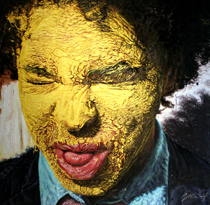Leaving Leslie Street
Isme Bennie
My sister was born two days before my birthday, actually three, as it was around leap year. My mother brought the baby home in time for my birthday party, which was held in our back yard. During the festivities, I fell off the swing into a nest of red ants, and had to be hauled off into the bathtub. A few days later I got veldt sores. I was highly contagious, and could not go near my mother or the baby.
Our maid Sarah took care of me – she did most of the time, anyway. After kindergarten one day she had taken me to see my mother in the hospital. She was Cape Coloured, the nearest description would be mulatto. I see her now, with a bowl between her knees, whipping cream into butter by hand. It was war time, World War 11, that is. We ate brown bread instead of white, and had tapioca instead of something…maybe rice? The servant’s quarters were at the back of the yard. Sarah lived there with her husband, James, our houseboy and gardener. Also, at the far end of the yard, was an outhouse. A sewage truck would come along the lane that ran behind to empty it, though we got an indoor toilet at some time.
The house was on Leslie Street. I don’t know the number any more, and there is no one left to ask. The house itself was a one-floor bungalow like most of the houses in the small South African town where we lived. My grandmother fed me on its screened-in back porch. I would sit on my father’s lap in the front living-room, or lounge, as we called it, with its leaded windows, and spell big words, accommodation was one. I loved words even then. I had my photograph taken there, sitting on the piano, a big bow in my hair. My friend Carol and I played there, planning our weddings. When I broke out into spots, probably German measles, I would not let the doctor near me to confirm the diagnosis. At that time I was sleeping on a small bed in my parents’ room, because my grandmother had the only other bedroom in our house. It became mine when she died, but I have no recollection of myself in it.
My sister and I didn’t spend much time together in the years that followed. It is only now, as adults, that we celebrate those close together birthdays. She was a toddler when we moved to our big new two-story house. I was nine. I took my doll, a Shirley Temple doll, named Mavis after the girl next door, with me. Sarah and James came too, to their new quarters with electricity and running water. They weren’t there for long, as I was now too old for a nursemaid. We took our cats with us, the black mother and the grey kitten, my Smokey. We put butter on their paws, supposedly to keep them from returning to the old house. And like the cats, I had no reason to go back. I only do that in memory.
*Â Â Â Â Â Â Â Â Â Â Â Â Â Â Â Â Â Â Â Â Â Â Â Â Â Â Â Â Â Â Â Â Â Â Â Â Â Â Â Â Â Â Â Â Â Â Â Â Â Â Â Â Â Â Â Â *Â Â Â Â Â Â Â Â Â Â Â Â Â Â Â Â Â Â Â Â Â Â Â Â Â Â Â Â Â Â Â Â Â Â Â Â Â Â Â Â Â Â Â Â Â Â Â Â Â Â Â Â Â Â Â Â Â Â Â Â Â Â Â Â Â Â Â Â Â *
After we moved, I still heard the whistle of a steam train as it chugged its way across the town. I still heard the barking of dogs at night, but dogs from our new neighborhood. There were no longer drunken Saturday night quarrels once Sarah and James were gone, replaced by the church-going housemaid, Paulina. She was black. And my kitten Smokey was growing into a big cat. Every morning early he would meow outside my bedroom door until I let him in and onto the bed. I had my own room on the second floor, with my own matching white furniture. I had my own bedside radio. I was going to school now, primary school, no longer at kindergarten singing “ring around the roses.†My class acted out “There Was An Old Woman Who Lived In A shoe†and chanted multiplication tables. Every day at 7.15 A.M., as I was putting on my blue and white school uniform and my black lace-ups, I would turn on my radio to a program of children’s stories. My favorite was in verse, about a pedigreed Persian of pedigreed fame who got led down the garden path… â€In the after years when the children came to that pedigreed Persian of pedigreed fame…. She told them their daddy was a travellin’ manâ€â€¦
The country finally got commercial broadcasting, , and every Sunday night I would listen to the Bayer Hit Parade on Springbok Radio, to Bing Crosby or Nat King Cole or whoever else had made it to the week’s top ten. My parents had a new radio too, not the black bakelite box that sat on a side table when we listened to the news during the War. This was a real piece of furniture, a low wooden cabinet like a sideboard. It had a turntable behind one door, and the radio behind the other. The radio had a short wave band, and I would fiddle until I managed to find the Voice of America. Through the static I heard Patti Page sing “How Much is that Doggie in the Window.â€
By now we also had a car, and we would go to the city, an hour away, to visit family or friends. I would also be taken, sometimes with my little sister, to the zoo, to the Rand Easter Show, where a television set was the main attraction one year, to the Christmas pantomime, and, when I was a bit older, to hear the visiting stars of the day, like Danny Kaye and Johnny Ray, also to ballet and theatre. Emlyn Williams doing Dylan Thomas’ “A Boy Growing Up†has stayed with me all my life.
On Sundays as we drove through the quiet city, I sometimes heard the plaintive sound of a saxophone: on a day off from work, African musicians getting together in a deserted building to play jazz. The sound touched me, but I was too young then to know that I was hearing the cry of South Africa.





Crystal clear images. Emotionally reminiscent.I really enjoyed this short story.
Evocative, poignant “…the cry of South Africa” and beautifully lean. Great!
Well written and evocative. You illustrate emotion well on paper. I am yearning to read more…
Your well written and vivid reminiscences bring back so many memories to those of us who also grew up in South Africa.
Another poignant story of South Africa. Keep them coming.
Beautifully evocative of time and place.
Such purposeful and clear writing …. it gets better and better ….you’ve given me such a wonderful window on a South Africa that pre-dates me and you’ve reminded me of a childhood song, “how much is that doggy in the window” !
Brought tears to my eyes. Please write more about those times in South Africa.
So reminiscent of those early childhood days in South Africa. I’m also learning a great deal about the times before the move to the big two-story house. It is fascinating reading and I would also love to hear more.